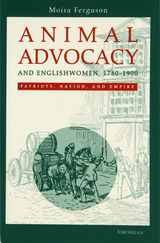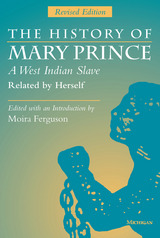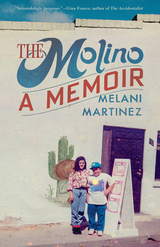2 books about Ferguson, Moira

Animal Advocacy and Englishwomen, 1780-1900
Patriots, Nation, and Empire
Moira Ferguson
University of Michigan Press, 1998
Animal Advocacy and Englishwomen, 1780-1900 focuses on women writers and their struggle to protect animals from abuse in the transition from preindustrial to Victorian society. Looking critically at the work of Sarah Trimmer, Susanna Watts, Elizabeth Heyrick, Anna Sewell, and Frances Power Cobb, Moira Ferguson explores the links between Britain's evolving self-definition and the debate over the humane treatment of animals. Ferguson contends that animal-advocacy writing during this period provided a means for women to register their moral outrage over national problems extending far beyond those of animal abuse, effectively allowing them to achieve a public voice as citizens. The writers in question represent multiple genres, time frames, and political approaches. Taken together, their productive lives span more than a century. They are ideologically divided on animal protection, and their political identities range from conservative Anglican Tories to radical reformers. Through their plural discourses on animal advocacy, these women actively participated in an ongoing humanitarian struggle that forged a connection between Englishness and kindness to animals, intensifying as industry and empire advanced, and effectively linked gender with national identity and self-definition. Their concerns resonate in a global as well as a national context; cruelty to animals emerges as a metaphor for imperial predation. In this sense, the writings constitute a gendered response to an evolving colonial discourse about others. Moira Ferguson is James E. Ryan Professor of English and Women's Literature, University of Nebraska. Her books include Subject to Others: Colonial Slavery, 1670-1834; Colonialism and Gender: Relations from Mary Wollstonecraft to Jamaica Kincaid; East Caribbean Connections; and The History of Mary Prince, A West Indian Slave, Related by Herself.
[more]

The History of Mary Prince, A West Indian Slave, Related by Herself
Revised Edition
Moira Ferguson, Editor
University of Michigan Press, 1997
Mary Prince was the first black British woman to escape from slavery and publish a record of her experiences. In this unique document, Mary Prince vividly recalls her life as a slave in Bermuda, Turks Island, and Antigua, her rebellion against physical and psychological degradation, and her eventual escape to London in 1828.
First published in London and Edinburgh in 1831, and well into its third edition that year, The History of Mary Prince inflamed public opinion and created political havoc. Never before had the sufferings and indignities of enslavement been seen through the eyes of a woman--a woman struggling for freedom in the face of great odds.
Moira Ferguson's edition of the book added an introduction, annotations, and appendices. The book has found popularity both in the classroom and with the general public. Recently, an adaptation of the memoirs of Mary Prince appeared as one segment of "A Skirt Through History," a six-part feature film series produced by the BBC. Mary Prince's story has also been the centerpiece of BBC radio broadcasts.
In this revised and expanded edition of The History of Mary Prince, Ferguson has added new material, based on her extensive research in Bermuda and London. The book includes new details of Mary Prince's experiences as a freewoman in England, the transcripts of several libel cases brought against her, and the reactions of British society, as seen in prominent periodicals of the day, against the original publication of The History of Mary Prince. This new material brings greater depth and detail and serves to more fully illustrate and contextualize the life of this remarkable woman.
Moira Ferguson is James E. Ryan Professor of English and Women's Literature, University of Nebraska.
First published in London and Edinburgh in 1831, and well into its third edition that year, The History of Mary Prince inflamed public opinion and created political havoc. Never before had the sufferings and indignities of enslavement been seen through the eyes of a woman--a woman struggling for freedom in the face of great odds.
Moira Ferguson's edition of the book added an introduction, annotations, and appendices. The book has found popularity both in the classroom and with the general public. Recently, an adaptation of the memoirs of Mary Prince appeared as one segment of "A Skirt Through History," a six-part feature film series produced by the BBC. Mary Prince's story has also been the centerpiece of BBC radio broadcasts.
In this revised and expanded edition of The History of Mary Prince, Ferguson has added new material, based on her extensive research in Bermuda and London. The book includes new details of Mary Prince's experiences as a freewoman in England, the transcripts of several libel cases brought against her, and the reactions of British society, as seen in prominent periodicals of the day, against the original publication of The History of Mary Prince. This new material brings greater depth and detail and serves to more fully illustrate and contextualize the life of this remarkable woman.
Moira Ferguson is James E. Ryan Professor of English and Women's Literature, University of Nebraska.
[more]
READERS
Browse our collection.
PUBLISHERS
See BiblioVault's publisher services.
STUDENT SERVICES
Files for college accessibility offices.
UChicago Accessibility Resources
home | accessibility | search | about | contact us
BiblioVault ® 2001 - 2025
The University of Chicago Press









